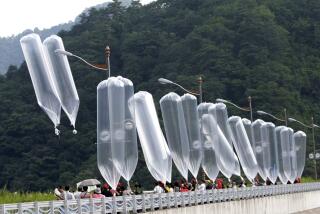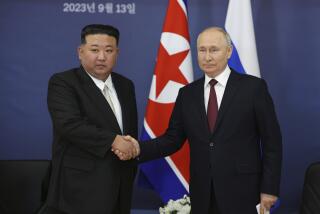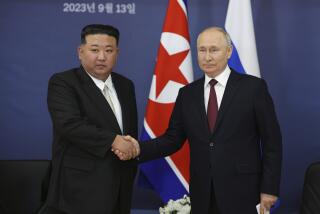Japan Called Conduit for N. Korea’s Military Program : Asia: Lax customs checks, tax rules benefit Pyongyang, a former supporter of regime says. Tokyo official terms claims ‘exaggerated.’
TOKYO — Japan is indirectly helping North Korea develop its military program--including nuclear weapons--by serving as a conduit for cash, equipment and atomic scientists, a Korean specialist charged here Wednesday.
Katsumi Sato, a former Communist and North Korean supporter who now heads the Modern Korea Institute in Tokyo, said that up to $1.8 billion annually, plus components ranging from semiconductors to computers, is being covertly funneled to Pyongyang by sympathetic Koreans living in Japan.
Yet the Japanese government is ignoring the flow--in fact, aiding it through lax customs inspections and favorable tax treatment--even though the isolated and unpredictable Communist regime of President Kim Il Sung has reportedly developed missiles capable of hitting Japan, Sato charged.
“Japan is making one of the most important, if not the most important, contributions to North Korean military development, even as Japan stands to lose the most,” he said at a news conference, citing documents obtained from the pro-Pyongyang group in Japan, North Korean defectors and Japanese government sources.
A Japanese official said that there was no government estimate of the amount of money funneled annually between Japan and North Korea but that Sato’s claims were “exaggerated.”
The official said there have been documented cases of North Korean residents of Japan investigated for trying to smuggle high-tech components, including those banned for export to communist nations under the international COCOM agreement. In 1988, for instance, police found that a trading firm had smuggled $555,000 worth of integrated circuits restricted by COCOM into North Korea via China. Other cases were found involving the smuggling of sonar and radar equipment.
In addition, North Korean students trained in atomic science in Japan are known to have returned to Pyongyang, the official said.
But he denied that there is evidence that such scientists or Japanese components were used for developing nuclear weapons.
“Of course, the money sent from Japan indirectly helps the budget of North Korea, but I can’t see any direct relation between the money and nuclear weapons,” the official explained.
Chosensoren, the pro-Pyongyang association for North Koreans in Japan, said Sato’s charges did not merit comment.
One North Korean source in Tokyo said about 6,000 Koreans in Japan visit Pyongyang each year, taking their relatives money and gifts ranging from autos to household appliances. But he said they do not take any illegal items and called Sato’s figures of the money flow “ridiculous.”
Still, the covert route of money and materiel to Pyongyang from Japan has become a growing concern. In a congressional hearing last month, former Deputy Secretary of Defense Paul D. Wolfowitz called for stronger U.S. pressure on Japan to stop the flow, which he estimated at $600 million annually.
But experts here say the Japanese government is not likely to crack down on North Koreans in Japan without a U.N. decision to impose economic sanctions. The number of Pyongyang sympathizers in Japan is sizable--about 300,000--and some key Japanese politicians back the Kim regime.
Shin Kanemaru, the most powerful politician in Japan until he was indicted this year for evading $1 million in taxes, was a strong supporter of North Korea and reportedly pushed for trade and diplomatic deals favorable to Kim.
Kanemaru was widely reported to have received extensive financial contributions from Kim--including at least some of the gold bars discovered in his safe this year during investigation of his case.
The current coalition government headed by Morihiro Hosokawa is unlikely to crack down on North Korea, experts say. The Socialists, the largest faction in the coalition, officially support Pyongyang over Seoul; Japan Renewal Party member Hajime Ishii is chairman of the Parliamentary League for Friendship between Japan and North Korea, and Chief Cabinet Secretary Masayoshi Takemura also developed friendly ties while governor of Shiga prefecture, analysts said.
As a result of such ties, Japan has remained the only capitalist nation to maintain significant trade relations with Pyongyang. In 1991, Japan ranked second only to China in trade with North Korea with a total volume of $481 million--including imports of fish, minerals and textiles and exports of machinery and textile materials, Japanese government figures show.
Eighty percent of the trade is conducted by North Koreans living in Japan, including establishment of 20 to 30 joint-venture garment factories.
Sato also criticized the U.S. State Department for putting too much faith in diplomacy rather than in the only language he says Pyongyang understands: force. He called for immediate economic sanctions against North Korea, enforced by a naval blockade, and stronger enforcement of COCOM regulations and Japanese foreign currency laws.
More to Read
Sign up for Essential California
The most important California stories and recommendations in your inbox every morning.
You may occasionally receive promotional content from the Los Angeles Times.











